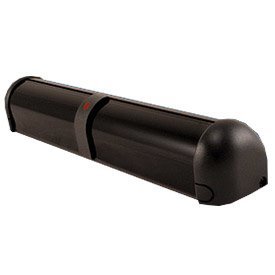
With all the responsibilities of business owners and property managers, it’s easy to see how something could get overlooked until it’s broken. In the case of automatic doors—as with any type of electromechanical system—a little preventive maintenance can pay off in a variety of ways.
For starters, a well-maintained automatic door system keeps guests and customers safe. A malfunctioning sensor or failing mechanical component is an injury waiting to happen, not to mention the resulting lawsuit.
Basic maintenance and safety checks can also help increase the longevity of your power door system.
As prime shopping season approaches with the holidays, consumers will be out in full force. That means more doorway traffic, but also armfuls of gifts and groceries passing between those doors. All of which puts more pressure on businesses to make sure their automatic doors can keep up with demand.

Basic maintenance and safety checks can also help increase the longevity of your power door system. With low-energy operators in particular, you want to ensure your door system is working efficiently, to get the most out of your investment. Otherwise you’re letting money out the door.
Although full inspections and adjustments are better left to the professionals, there are a few steps you can take to keep your automatic doors working smoothly this holiday season and well beyond.
Perform daily safety checks
Most driving instructors will tell you to do a vehicle walk-around every time you’re preparing to drive. And like most people, you’ve probably grown lax in this regard.
Still, the advice is sound. And it’s just as relevant to automatic doors.
In fact, the American Association of Automatic Door Manufacturers (AAADM) recommends performing the following safety checks every day:
- Activate the door. Door should open at a slow smooth pace (4 seconds or more) and stop without impact.
- Door must remain fully open for a minimum of 5 seconds before beginning to close.
- Door should close at a slow smooth pace (4 seconds or more) and stop without impact.
- Inspect the floor area. It should be clean with no loose parts that might cause user to trip or fall. Keep traffic path clear.
- Inspect door’s overall condition. The appropriate signage should be present and the hardware should be in good condition.
If your automatic door system uses a sensor, you can simply test it by walking toward the door at different speeds and angles. As the AAADM notes, the door should swing or slide open smoothly and stop without impact. For two-way door openings, you’ll want to repeat the process on both sides to ensure everything is working smoothly.
Once you’ve stepped out of the sensor zone, the door should stay open for a brief delay before closing smoothly.
Keep up with the weather
Winter presents its own challenges for automatic doors. The most common of these is salt, ice and other debris, which can get into the tracks of sliding doors and compromise performance.
It’s a good idea to keep an eye out for this during your daily inspection (see above), and check back occasionally throughout the day, clearing the tracks and the area around your doors as weather dictates.
During the holidays in particular, ensure that doorways and vestibules remain clutter-free. Look out for decorations, sales promotions, mats, loose weather-stripping or anything else that might impede access, get in the way of push-plate switches or even interfere with the door’s sensor.
Speaking of sensors, adverse weather such as snow and rain can cause interference, leading to unexpected—and unwanted—behavior from your automatic doors. This is another point to consider during your daily check, or, again, as weather dictates.
Of course, some manufacturers have already factored that into the equation. BEA Bodyguard and Eagle door sensors, for example, come with special snow and rain modes, which filter out interference caused by weather.

The Bodyguard Automatic Door Sensor from BEA comes with snow mode to filter out interference
Understand the limitations of your door operator
It’s important to note that power door operators are designed with certain conditions in mind, such as high-traffic entryways or windy environments. Likewise, some are designed to operate heavy doors, while others simply aren’t up to the task.
If your door operator isn’t properly suited to your needs, it could be working overtime and wearing down prematurely.
If your door operator isn’t properly suited to your needs, it could be working overtime and wearing down prematurely. In cases like this, no amount of maintenance will solve the problem. Your best option—for safety, performance and long-term return on investment—could be to upgrade to a more suitable product.
Trust the professionals
In addition to daily safety checks, the AAADM also recommends having your automatic doors inspected by a certified technician at least once a year.
Keep in mind, too, the potential dangers of a malfunctioning or poorly adjusted automatic door system. Many products on the market today—though easy to use—are complex pieces of technology that need a professional touch.
As AAADM certified and trained technicians, ABC Security can help ensure your automatic door system works safely and reliably, while keeping you compliant with the latest regulations. Contact us to discuss a maintenance plan for your doors, or to discuss opportunities to upgrade.


 blog
blog